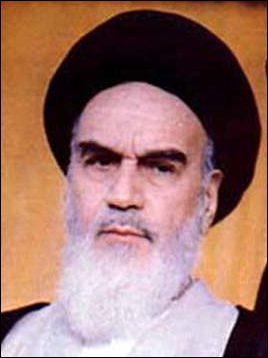Home | Category: Conservative Muslim Groups / Jihadist Groups
ISLAMISTS AND MUSLIM EXTREMISTS
Ayatollah Khomeni Islamists and Muslim extremists believe that countries with large Muslim populations should become Muslim states governed by Sharia (Islamic Law). They generally want a return to some kinds of Islamic purity, despise modernism and the West, and blame them a number of problems. They also oppose peace with Israel and are hostile to the West and secular leaders in the Muslim world. Their primary beef is with the West and leaders and people in their own societies that have been Westernized and one of their primary goals is to get rid of them.
Islamists and Muslim extremists are similar but not exactly the same. Islamism and Muslim extremism are terms used to describe a variety of modern reform movements that aim to “restore” Islam to political power. They reject modernism and secularism and call for a return to religious purity. Muslim extremists are Islamists and fundamentalists with extreme views.
Islamists were long described as fundamentalists. Fundamentalists are not unique to Islam. Many scholars don’t like the term Islamism. The are Jewish fundamentalists, Christian fundamentalists, Hindu fundamentalists, Sikh fundamentalists and even Buddhist fundamentalists. Most of these groups reject modernism and secularism and call for a return to religious purity. The term originated in the United States in the early 20th century as a way of distinguishing some radical Protestant churches from other Protestant churches.
There are degrees of Islamism. Some simply want to check the spread of Western ways in the Muslim world. Some support a moderate form of Muslim law. Others, like the Taliban support a more extreme and severe form of Muslim law. Yet others support anti-Western Muslim terrorists like Osama bin Laden. Terms like Islamist and Muslim extremists have similar meanings as fundamentalists. A jihadist is someone who embraces militant Islam.
Websites on Muslims Divisions Divisions in Islam archive.org ; Shi’a History and Identity shiism.wcfia.harvard.edu ; What is Shi'a Islam? iis.ac.uk ; Four Sunni Schools of Thought masud.co.uk ; History of Islam: An encyclopedia of Islamic history historyofislam.com ; Oxford Encyclopedia of the Islamic World oxfordislamicstudies.com ; Sacred Footsetps sacredfootsteps.com ; Internet Islamic History Sourcebook fordham.edu/halsall/islam/islamsbook ; Islam IslamOnline islamonline.net ; Institute for Social Policy and Understanding ispu.org; Islam.com islam.com ; BBC article bbc.co.uk/religion/religions/islam ; Islam at Project Gutenberg gutenberg.org
RECOMMENDED BOOKS:
“Islamism and Islam” by Bassam Tibi Amazon.com ;
“Conservative Islam: A Cultural Anthropology” by Erich Kolig Amazon.com ;
“The History of Jihad: From Muhammad to ISIS” by Robert Spencer Amazon.com ;
“Suicide of Reason: Radical Islam's Threat to the West” by Lee Harris Amazon.com ;
“The Crisis of Islam: Holy War and Unholy Terror” by Bernard Lewis Amazon.com ;
“Ibn Taymiyya (Makers of the Muslim World) by Jon Hoover Amazon.com ;
“Wahhabism: The History of a Militant Islamic Movement” by Cole M. Bunze Amazon.com ;
“Salafism and Traditionalism: Scholarly Authority in Modern Islam”
by Emad Hamdeh Amazon.com ;
“The Making of Salafism: Islamic Reform in the Twentieth Century” by Henri Lauzière Amazon.com ;
“Sayyid Qutb and the Origins of Radical Islamism” by John Calvert Amazon.com ;
“Milestones” by Sayed Qutb Amazon.com ;
“The Muslim Brotherhood: Evolution of an Islamist Movement” by Carrie Rosefsky Wickham Amazon.com ;
“Inside the Muslim Brotherhood: Religion, Identity, and Politics” by Khalil al-Anani Amazon.com ;
“Hizb ut-Tahrir: The Untold History of the Liberation Party”
by Reza Pankhurst Amazon.com
Beliefs of Islamists and Muslim Extremists
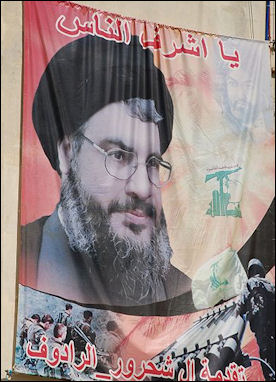
Hezbollah's Hassan Nasrallah Most Islamist and Muslim extremist groups want to introduce or strengthen the use of Sharia — Islamic law — which emphases the puritanical form of Islam and bans or at least frowns on up things like music, alcohol, and women rights. They tend to be anti-Semitic and believe Jewish conspiracy theories and have other bigoted, reactionary views.
Islamists believe that the foreigners, and Americans in particular, damage Muslim religion, culture and society. The Islamic agenda is pushed by Islamic schools, charities and satellite television stations, many based in the oil rich countries such as Saudi Arabia, the United Arab Emirates and Qatar, and supported with money from the governments in these countries. These groups spend billions of dollars getting out their message and sometimes preach blatant hatred towards the West.
Islamists often view many things as “haraam” (“forbidden”). These can include pet dogs, unveiled women and even music. Cheerful, polite young men that embrace Muslim extremism often become cold and stern. They sneer with contempt at anything associated with the West and refuse to shake hands with women or even look at them. For some, whenever music is played on a television or radio they turn it off or leave the room. The treatment of women, women’s clothing and how women should act in society are all important issues to Islamists. Islamist women are often identified by garments that cover their entire face and hide the shape of their bodies. Islamist men are often identified by their long, unkept beards. A long beard, Afghan-style clothes and burqas are obvious signs of Islamic Islamism.
Paul Berman, author of “Power and Idealist” wrote in the New York Times, “Radical Islam is a modern philosophy, not just a heap of medieval prejudices. In its sundry versions, it draws on local and religious roots, just as it claims to do. But it also draws on totalitarian institutions from 20th-century Europe.
Muslim extremists and Islamists may preach global jihad and violence or they may not. Fareed Zakaria wrote in Newsweek, groups with an Islamist agenda “stunt their countries and dishonor their religions. But not all Islamists advocate global jihad, host terrorists or launch operations against the outside world — in fact, most do not. Consider, for example, the most difficult example, the Taliban. The Taliban have done all kinds of terrible things in Afghanistan, But so far, no Afghan Taliban has participated in any significant level in a global terrorist attack over the past 10 years — including 9/11. There are certainly element of the Taliban that are closely associated with Al Qaida, but the Taliban is large, and many factions have little connection to Osama bin laden. Most Taliban want Islamic rule locally, not violent jihad globally.”
See Sayyid Qutb Under the Muslim Brotherhood and Political Parties
Support for Islamism
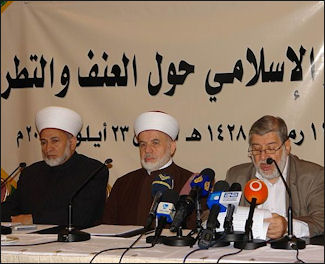
Muslim Brotherhood Although many terrorists have Islamist views and many Islamist sympathize with aims of terrorist groups, it is still a big leap from Islamism to terrorism and few Islamists become terrorists. By some counts, 10 to 15 percent of the Muslim population support Islamists and Muslim extremists.
In many repressive Muslim countries, Islamist groups have been the principal opposition. In many cases these groups have been repressed by their governments. Where Islamic states have taken hold they have failed to deliver economic prosperity and human rights. There has been a conflict between the Iranian concept for Islamism and the Saudi-Wahhabi view. Both has vied for dominance in the Arab world
Many Islamist groups feel threatened, and often those fears are not unwarranted. They are often brutally repressed by their governments. This repression breeds resentment and fear and the creation of underground anti-government cells and this in turn often leads to a cycle of more extremist views and actions and repression by the governments.
Islamists have been successful winning popular support even though their political parties have been banned because they are well organized and operate through mosques. Islamists have made great headway in democracies. Islamist parties such as the Shiite-dominated United Iraqi Alliance, Lebanon’s Hezbollah and Egypt’s Muslim Brotherhood have all done well in elections.
Reasons for Islamism
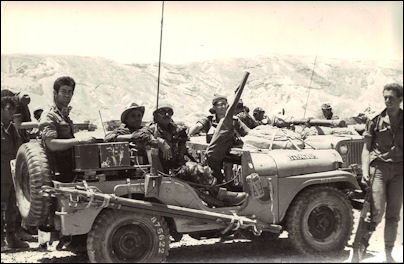
Six Day War in Israel Many Muslims remain poor and feel betrayed by corrupt leaders backed by the West. They have looked to religion for answers and have been swayed by Islamic leaders who condemn the West and modernity. The Economist's Brian Beedham said that many Islamists are "simple and emotional people" led by politicians "unscrupulously willing to use Islam as a banner, and a weapon, against the outside world."
Islamists have been described as being "religious-minded" without "religiosity," meaning they regard themselves as religious but don’t necessarily follow the message of their religion. Islamists tend be very selective with their religion, choosing scripture and tenants supporting their positions rather than following the religion as a whole.
Islamists groups are not much different in their goals and methods than Christian and Hindu fundamentalist groups. They all tend to interpret their scriptures literally and select the scriptures that support their beliefs and agenda. If you criticize them you criticize God and deserve to be dealt with harshly.
It has been argued that "Islamism is not the result of the spread of Western values, but the fact that these values spread and can not be satisfied. The way to stem extremism is to offer the people a real hope of prosperity."
History of Islamism
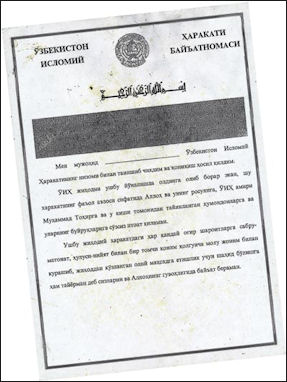
Islamic Movement of Uzbekistan
oath of allegiance Influential figures that helped shape modern Islamism include Jamal al-Dun al-Afghani (1838-1897), a Persian Shiite who was leader of the Islamic unity movement which called for Muslim nations to unite to answer the threat posed by the posed by the West; Shaik Muhammad Abdul of Egypt (1849-1905), who was concerned with interpreting Islamic law so that it observed the basic principals of Islam. Jamal al-Dun al-Afghani and Shaik Muhammad Abdul were both regarded as neo-Wahabbist and were an inspiration to the founders of the Muslim Brotherhood.
Abdul Ala Mawdudi (1903-79), the founder of the Jamaat-Islami party in Pakistan, is regarded by some as the father of modern Islamic Islamism. He opposed secularism, called for a return to Sharia law, called jihad a central tenet of Islam, and called on Muslim to resist Western modernism. Indian-born Sayyid Abul A’la Mawdudi was one the first to call for a return of the caliphate.
See Wahhabism, the Muslim Brotherhood
Early Palestinian militancy and political activism was based more on ideas of Arab nationalism and Marxist-Leninism than Islamic beliefs. The modern Islamist movement got going in earnest in the 1970s and gained momentum with the Iranian Revolution. The rebirth of Islam is attributed to social dislocation, economic hardship, and political frustration. Religious fervor that began in Iran in 1979 has been intensified by feelings of disgusts toward Israel have spread across the entire Muslim world.
The Islamic movement took root in the Middle East and spread to other Muslim countries. It began as a reaction to Arab nationalism and the failure of political states to address the unequal distribution of wealth and the failure of ordinary people to be able to address the problem in their lives. The movement looked to Sharia as the solution to the problem rather that secularism and Western political ideology. One Egyptian diplomat told Reuter, after the Arab defeat in 1967 to Israel and lack of success of secularism in Muslim countries "there was disillusionment. People began to return to godly laws they had abandoned. People were searching for an identity and they had no alternatives to Islam, in which they saw an identity and a solution."
The Middle East has become more Islamic in the last 30 years. More women wear head scarves and more mosques are being built than in the past. Many new buildings have been built with special prayer areas.
By the 1980s, Islam had entered political discussions in a way it hadn’t before. Reason for this include the involvement of conservative rural peasants in the political arena; the migration of these people to the cities; the large number of disenfranchised people in the cities and the spread of the mass media. Different groups have different agendas and use Islam in different ways. Sometimes the same group, such as the Muslim Brotherhood, can be different on different countries.
Iran Revolution and the Mecca Revolt
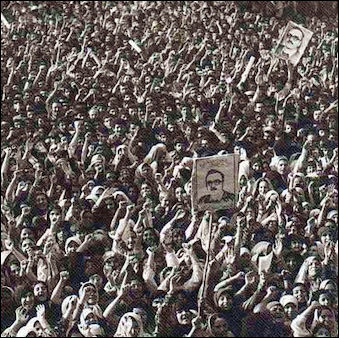
Iranian Revolution Iran has been a leader in the Islamist movement. The Iran Revolution of 1979 caused a rebirth of Islam among people in the Middle East suffering from social dislocation, economic hardship, and political frustration. Religious fervor that began in Iran in 1979 and has been intensified by feelings of disgust towards Israel have spread across the entire Muslim world.
The Iran Revolution of 1979 dramatically changed the Middle East, ushering in a period of instability and unrest. The Iranian leaders encouraged Shiite minorities in all of the Middle East to rise up against the Sunni majority. Many scholars view the Iran-Iraq war of the 1980s as an effort to contain the rise of Shiite influence in Iraq, Lebanon and the Persian Gulf.
In November 1979, a group of about a 350 armed Muslim radicals, stormed the Grand Mosque during morning prayers in Mecca — Islam’s holiest site. Inspired in part by the Iranian Revolution, they demanded that one of their members be declared a mahdi, a Muslim equivalent of a messiah. When the chief imam at the mosque said that such a claim was heretical, shooting broke out and the radicals took hostages.
Most of the radicals were Saudis but there also Egyptians, Kuwaitis, Pakistanis, Sudanese Yemenis, Somalis and one Ethiopian. The group claimed that their aim was to “purify Islam” and liberate the Holy Land from the royal “clique of infidels.” The leaders of the radicals used loudspeakers to condemn the West and their Saudi accomplices and called for a return to basic Islamic values. They also demanded the banning of Shiites from Mecca’s shrines and the end of women’s higher education, television and soccer.
The 26 gates of the Great Mosque were closed and bolted and the radical were sealed inside. Members of the Saudi army, National Guard, and Ministry of Interior forces surrounded the mosque and sharp shooters were placed in the minarets. Perhaps 50,000 worshipers were trapped inside. The radicals hid in the mosque’s maze of subterranean tunnels. The siege lasted for two weeks and ended only after bloody battles within the mosque itself. Three bullets struck the Kaaba. The minarets were so shot up they had to undergo extensive repairs. The revolt caused great upheaval in Muslim world community and was a great embarrassment to the Saudi royal family, guardians if Islam’s holiest shrines. An estimated 250 people were killed. The leader of the radicals and 62 of his followers were beheaded.
Activities of Muslim Extremists
Muslim extremists in Iraq have gone around to neighborhoods with fliers and posters with edicts banning vices such as “music-filled parties and all kinds of singing,” “gunfire celebrations at weddings,” “gatherings of young men” at markets and outside girls’ schools, “the selling of liquor and narcotic drugs and “wearing improper Western clothes and having long hair.”
In its most extreme, Islamist beliefs about purity are used to kill just about anyone in the name of reviving the days of the Prophet. In 2006, several Baghdad falafel vendors were killed by Islamists because falafels didn’t exist in the 7th century.
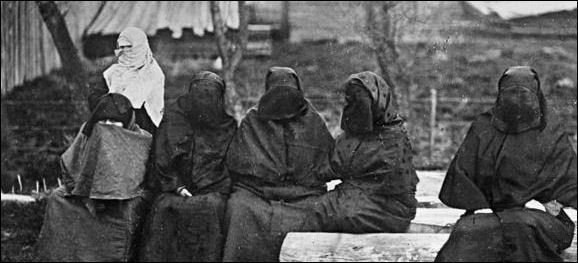
Veiled women
Mansour al-Nogaidan, a Bahraini-based journalist, wrote in the Washington Post, that he witnessed a fair amount of hypocrisy and corruption in the Islamist world. “I saw Islamic judges, ignoring the marks of torture bourne by my prison comrades. I learned of Islamic teachers who molested their students. I heard devout Muslims who never missed the five daily prayers lying with ease to people who did not share their extremist beliefs.”
Opposition to Islamism
Some have argued that the best way to combat radical Islam is to forges bonds with traditionalists who reject Western decadence and secularism but also shun violence and extremism. On his effort to challenge Islamists al-Nogaidan wrote: “My old companions from the jihad felt obliged to declare themselves either with me or against me. Some preferred to cut their links to me silently, but others fought me publically, issuing statements filled with curses and lies...I became a favorite target in the Internet, where my writings were lambasted and labeled blasphemous...Eventually I was fired.”
In 2010, the third place finisher on the popular Middle Eastern television show “Million’s Poet” was Saudi housewife Missal Halal who, draped in a black Ababa and face-covering niqab, performed a stinging piece called “the Chaos of the Fatwas” that won a standing ovation from the audience. The poem lashed out at Islamists, accusing them of “preying like a wolf” on those who seek progress and peace, and compared suicide bombers as “monsters wearing belts.”
Hilal told the Times of London, “I entered the competition because I felt that this was my chance to speak to a lot of people to express my feelings about life, love and the situation we are in today. I felt I had to say that across the Arab world we are afraid of extremism and the effect it has had. What sort of society do they offer us? They offer nothing but fear, I hate it so much.”
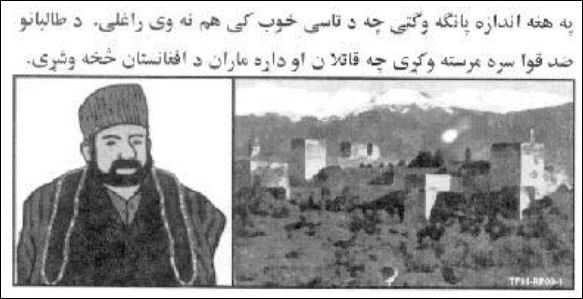
Taliban bounty leaflet
“They are killing the true spirt of religion. It should be found in mercy, forgiveness, love. They try to stop us connecting with other people, to keep us frightened and alone...Arab women are strong and brave but we used to be much more free than we are today. We were allowed to make coffee for our guest, to speak to our neighbor. But the extremist took away the true spirit of our society and now men and women mistrust each other.”
MODERATE MUSLIMS
Moderate Muslims are seen as ones that believe in tolerance and democracy, reject literal interpretations of the Qur’an and want to update the Muslim texts and laws to be in tune with the times. They believe that things like the Qur’an’s acceptance of slavery, the appointment of male guardians for women and acceptance of (light) wife beating and ideas about jihad, apostasy and blasphemy need to be reformed.
Moderate Muslims tend to be members of the middle class, educated and have good jobs. Many jihadist also have the same profile with the exception that many can’t find good jobs.
In his study of Muslim moderates, John Kelsay, a professor of University at Florida State University, said moderates “do not in fact dissent from the militant judgments that current political arrangements are illegitimate”. They agree with militants that “democracy implies a kind of moral equivalence between Islam and other perspectives . And such a situation is dangerous, mo for the standing of the Muslim community, but for the moral life of humankind.”
Moderate Muslims in the yes of the West have been accused of remaining silent instead of condemning acts of violence and repression done in the name of Islam by extremist government, groups and individuals. At the same time they have been targets by Muslim extremist for betraying Islam and received death threats for calling for reforms and not taking the Qur’an literally.
In April 2010, many were encouraged when Muslim scholars from a dozen countries condemned suicide bombings by Islamist rebels in Moscow and Dagestan, that left more than 50 dead, as “criminal terrorist attacks: that violated their faith. The scholars spoke out against violence in Iraq. A Dubai-based scholar said,, “Islam absolutely upholds the sanctity of human life and no grievances, even when legitimate, can ever be used to justify or legitimate such murderous and evil acts.”
See Modernity and Reform, Muslims and Islam
Moderate Muslims Thinkers
Liberal clerics have to tred carefully to avoid being attacked by Islamist. One sheik, the leader of a popular Sufi sheik, was denounced and decadent and corrupt after he failed to reprimand his followers for drinking liquor and wearing revealing clothes.
Even the most liberal and moderate of Muslim thinks and clerics are against sex outside marriage, the consumption of alcohol and homosexuality although liberal generally call for tolerance and light punishment towards who break these prohibitions.
Ali Gomaa, the Grand Mufti of Egypt and one of the highest-ranking clerics in Sunni Islam, is arguably the most powerful and respected Muslim figures to speak out against Muslim extremism and Islamism and Wahhabism. Appointed by the Egyptian government to his position, he has called radical cleric narrow minds and highlighted the role of women in Islam.
Mahmoud Muhammad Taha
Mahmoud Muhammad Taha, a unorthodox Sudanese mystic, has been widely praised for his peaceful, tolerant vision of Islam. In his 1970 book “The Qur’an, Mustapha Mahmoud and Modern Understanding” he argues Islam in its original, uncorrupted form offers a solution to the sometimes conflicting “individual’s need for absolute freedom with the community’;s need for total social justice” and has room for women and people of other rr10 to be accommodated and treated as equals.”
In his 1967 book “The Second Message” he argues that the verses revealed to Muhammad while he was in Mecca—that are filled with ideas of freedom and equality—are have precedence over those revealed in The Medina—which are filled with rules, coercions and threats including orders for jihad, and were used to justify Sharia—and were meant to embraced when humanity was ready for it.
Taha was born in the small Sudanese town of Ruffa. He studied civil engineering at university and worked for a while for Sudan Railways before starting his own engineering business. In 1945 he founded Sudanese political group, and was imprisoned twice: once for writing pro independence pamphlets and a second time for a protest over female circumcision., After he was released from prison the second time he entered a three-year period of seclusion, prayer and fasting in a mud hut. During that time he developed his new vison of the Qur’an and devoted the rest of his life to teaching it.
Taha opposed strict applications of Sharia. The movement Taha founded is known as the Republic Brothers. It was sunder constant attack by the Muslim Brotherhood, which accused Taha of thinking he was a kind of new Prophet. . In 1985 Taha was executed for sedition and apostasy for protesting the imposition of Sharia in Sudan.
Among the thousand present at his execution was the journalist Judith Miller, In her 1996 book “God has Ninety-Nine Names” she wrote: Shortly before the appointed time, Mahmoud Muhammad Taha was led int the courtyard. The condemned man, his hands tied behind him, was smaller than I expected hi to be and...as the gauds herded him along he looked younger than his seventy-six years. He held his head high and stared silently into he crowd, When they saw him, many in the crowd leaped to their feet, jeering and shaking their fists at him, A few waved thick Qur’ans in the air...I managed to catch only a glimpse of Taha’s face before the executioner placed an oatmeal-colored sack over his head and body but I shall never forget his expression. His eyes were defiant, his mouth firm, he showed no hint of fear,”
Moderate Muslims in the West
Among the leading moderate Muslim intellectuals is the London-based Swiss Muslim Tariq Ramadan. The author of the book “Western Muslims and the Future of Islam”, he accepted a teaching position at Notre Dame University but was denied a visa by the United States government because he allegedly supported terrorism and violated the U.S. Patriot Act. He shocked y the decision. Saying that he was worked tirelessly to promote understanding between and Muslims and Westerners and has been involved in trying to show that one can be Western and Muslim at the same time. His support of terrorism was based on donation of $940 two humanitarian organizations (one Swiss-based and another France-based) that provided assistance to Palestinians.
Ramadan wrote in the Washington Post, “I have called upon Western societies to be more open towards Muslim and to regard them as a source of richness not just violence or conflict. I have called up Muslims in the West to reconcile and embrace both their Islamic and Western identities. I have called for the creation of a “New We” based in common citizenship within which Buddhists, Jews, Christians, and people with mo religion can build a pluralistic society. And yes, I believe we all have a right to dissent, to criticize government and protest undemocratic decisions. It is certainly legitimate for European Muslim and American Muslims to criticize their governments if they find them unjust.”
“In the mid 2000s, a Canadian Muslim named Mubin Shaik acted as an undercover agent for the Canadian verison of the FBI infiltrated a group that ran a terrorist camp and planned to bomb a government target. His work help break up the group and led to many arrests. Within the multifaceted Muslim community to which he belongs in Toronto some embraced him as hero but others condemned him for being an informer and betrayer. One host of an Islamic talk show said, “Individuals cannot credibly spy on their own community while remaining a member of it.”
Moderate Muslim Media Figures
Amr Khaled is a well known television personality in the Muslim world. An Egyptian born in 1968, he hosts a popular show on Iqra, is a Saudi-owned religious satellite television channel, and has one of the Arab world’s most popular websites, receiving tens of millions of hits annually. Described as a Muslim Joel Osteen or Dr. Phil, he espouses a “purpose-driven life” philosophy that encourages Muslims to take charge of their lives and be a positive member of society using Islam. He advocates friendly relations with the West and hosted an Interfaith conference in Copenhagen after the controversies over the Danish cartoons that mocked the Prophet Muhammad. [Source: New York Times magazine, April 30, 2006]
Khaled was ranked 62nd in Time magazines list of the world’s 100 most influential people in 2006. He has been called a televangelist who has revolutionized the way Islam is delivered to audiences. Wearing Western suits or jeans and sporting a mustache but no beard, he conveys the Prophet’s message using folksy stories and slangy Arabic and comes across as almost the opposite of the grim-face, bearded Muslim clerics in a robe and turbans. Khaled is involved in a number of social outreach programs ans charities. Women find him Khaled sexy. He used to give out his phone number to almost anyone and often engaged in long conversations with complete strangers on his cell phone.
At a lecture in Washington D.C. area, Khaled began. “My goal is that you leave happy. My goal is to fulfill the hadith of the Prophet Muhammad, peace be with him, that says ‘Whoever puts joy in the ears of the believers, his reward is not less than Paradise...I implore you to be active in society, don’t isolate yourself.” Robin Wright wrote in the Washington Post, “the crowd ate it up. Fo r the next 90 minutes, they laughed at has witticisms, smiled at his stories, nodded at his exhortations and clapped again—spontaneously and often. But most of all, they listened intently.”
Wright wrote, “Khaled, a tall man with piecing eyes and an impish laugh, usually begins his lectures slowly and swiftly, the cadence and emphasis steadily building. As he gets worked up, he gets more animated, pinching his fingers together or spreading his arms.” At some of his appearances an Islamic hip-hop group performs. His stories include ones about Muhammad and his companions spitting watermelon seeds at one another.
When he speaks Khaled is surrounded by a phalanx of bodyguards. Islamist don’t like him because of his Western style and outspokenness on women’s rights. Cleric criticize him for his lack of training and his upbeat message. Reformists criticize him for maintaining the status quo and encouraging young women to wear veils.
Image Sources: Wikimedia Commons
Text Sources: Internet Islamic History Sourcebook: sourcebooks.fordham.edu ; Arab News, Jeddah; “Islam, a Short History” by Karen Armstrong; “A History of the Arab Peoples” by Albert Hourani (Faber and Faber, 1991); “World Religions” edited by Geoffrey Parrinder (Facts on File Publications, New York); “Encyclopedia of the World’s Religions” edited by R.C. Zaehner (Barnes & Noble Books, 1959); Metropolitan Museum of Art, Encyclopedia.com, National Geographic, BBC, New York Times, Washington Post, Los Angeles Times, Smithsonian magazine, The Guardian, Al Jazeera, The New Yorker, Time, Newsweek, Reuters, Associated Press, AFP, Library of Congress and various books and other publications.
Last updated April 2024

